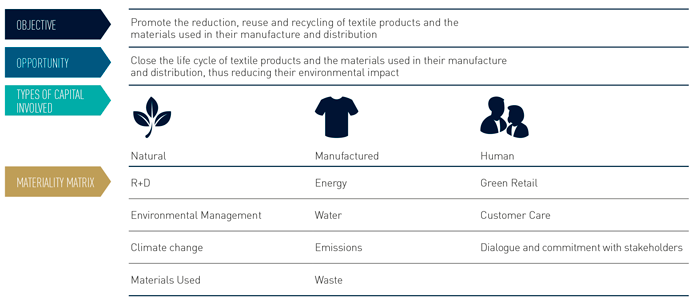4. Reduction, reuse and recycling

Reuse
Another point of focus of Inditex's Sustainable Plan 2011-2015 consists of promoting the reuse and recycling of textile products and the materials used in their manufacture and distribution. Inditex has several projects dedicated to closing the life cycle of the materials used in all centres owned by the Group. Plastic, paper and carbon account for the majority of waste. Mechanisms have been installed to reduce the volume of plastic and paper by 95% and 90% respectively in order to optimise transportation and storage. Emphasis is also given to raising the awareness of personnel to ensure waste is correctly separated as these are quite often transformed into by-products that are then sold on to other companies.
As regards the reuse of textiles, Inditex collaborates with the cooperative, Roba Amiga, to improve the management of second-hand clothes and thus reduce textile waste through a scheme that promotes the inclusion of individuals who are socially excluded or who are at risk of social exclusion. In 2011, a 3-year partnership agreement with an allocated budget of €450,000 was signed. From March 2012 to September of the same year Oysho donated 125,000 garments and the recycling or sale of these items helped create 75 jobs for individuals at risk of social exclusion
Another initiative to encourage creativity and recycling is the Coknit Connect of the IED Moda Lab in Madrid. Using unwanted products donated by Inditex, IED fashion design students develop and create avant-guard designs in an exercise that focuses on recycling and talent. The final creations are shown in a fashion show at the end of the academic year, proof that it is possible to combine sustainability and cutting-edge fashion in the world of textile creations.
Inditex's waste management model

Reduction and recycling
Correct waste management and waste minimisation plays a critical role in the development of Inditex's activities. For this reason, the Group has:
- An integrated management system to efficiently handle packaging and packaging waste
- An ISO 14001 environmental management system in its own factories, logistical centres, central headquarters and offices
- Its own sustainable and efficient Waste Management Model adapted to meet Inditex’s characteristics and needs.
ZNormativa is a set of rules and regulations common to all Inditex suppliers which offers the possibility of optimising the packaging process, waste management as well as the distribution and logistical process. This includes specifications about how the products should be packaged, distributed and transported, as well as the technical characteristics of the packaging materials used.
The Good Waste Management Practices include the methodology of work used to manage waste that has the greatest impact and which accounts for the majority of the waste generated by the Group's operations (plastic, paper, cardboard and textile). It gives instructions to help reduce the content of packaging material, improve waste separation and storage and facilitate recycling.


